






Dean Michael Georgiopoulos, Ph.D.
Chair Yoav Peles, Ph.D.
Marisa Ramiccio Marketing and Communications Manager CONNECT



@ucfmae mae.ucf.edu Department










Dean Michael Georgiopoulos, Ph.D.
Chair Yoav Peles, Ph.D.
Marisa Ramiccio Marketing and Communications Manager CONNECT



@ucfmae mae.ucf.edu Department


Dear Friends and Colleagues,
face. His interview with Fox 13’s Raytheon. Breakthroughs in Science received We also highlight our student 3.5 million views on YouTube earlier recipient of the prestigious
This past year has been record- this year and his work in hypersonics Chateaubriand Fellowship, who is breaking for the UCF College of has gained much media attention conducting research in France as you Engineering and Computer Science in over the years. The university recently read this, and our college’s Lockheed terms of research funding. The college celebrated the opening of a new Martin Work Experience Program, garnered more than $60 million in hypersonics facility adjacent to the which provides students with an funding during the previous fscal main campus, where Ahmed and engaging work experience while year, and 23 individual proposals several other researchers will continue they’re still in school. received at least $1 million in funding their promising work. You can see Finally, I want to bid you all a fond – both records that have been set and a picture from the ceremony on the farewell. This will be my fnal message no doubt will be broken in years to back cover of this issue. as chair as I’m stepping down at the come.
One millionaire you might not be end of the fall semester. It’s been a
Several of those funded proposals as familiar with is Assistant Professor pleasure serving in this capacity and are from mechanical and aerospace Qiushi Fu. He’s a rising star in our I look forward to meeting the next engineering faculty, whose innovative biomedical engineering program and leader of this department. As always, I research and groundbreaking is studying limb coordination to help hope you enjoy this issue. discoveries are supported by industry patients who have sufered a stroke or As always, I hope you enjoy this organizations such as NASA, the who have neurological disorders. issue. U.S. Department of Defense and the
Also in this issue, you can read National Institutes of Health. We call about aerospace engineering doctoral Go Knights! Charge On! these faculty members the ‘MAE student Sydney Giannuzzi, who has Millionaires’ and you can learn more already made a name for herself. She about them and their work in the was selected as one of Aviation Week Yoav Peles following pages. Network’s 20 Twenties for 2024, and Professor and Department Chair
One of millionaires, Professor was recognized for her outstanding UCF Department of Mechanical and Kareem Ahmed, may be a familiar work during a summer internship with Aerospace Engineering

Aviation Week Network selected aerospace engineering doctoral student Sydney Giannuzzi as one of 20 students from around the world who will shape the industry.
For aerospace engineering doctoral student Sydney Giannuzzi, 2023 turned out to be a stellar year. She not only completed a summer internship with Raytheon Technologies, but was recognized for her outstanding contributions with an Innovation Achievement Award. 2024 brought another cosmic leap in her career — a slot on the Aviation Week Network 20 Twenties list.
Giannuzzi is one of 20 students from around the world who were selected for the honor, which recognizes individuals who are on track to change the industries of aerospace, aviation and defense. Nominees are evaluated on their academic performance, civic contributions, personal challenges and the value of their research.
This year, 100 students from 48 diferent colleges and universities in 13 countries were nominated, which is the largest pool to date.
“I am also immensely grateful to my advisor, Dr. Jefrey Kaufman, for nominating me to even be considered for such an award. He is such an incredible supporter and advocate for his students.”
With the support of Kaufman, the current director of the aerospace engineering program, and Seetha Raghavan, the former program director, Giannuzzi is the fourth woman from UCF to be named a 20 Twenties awardee. She is also one of 12 women included in the Class of 2024, refecting Aviation Week Network’s commitment to diversifying its group of evaluators and applicants. Giannuzzi says that assembling a diverse list of winners today can impact the workforce of tomorrow.
“Highlighting a wide variety of individuals in aerospace from unique backgrounds shows how we all can provide diferent insight and skills to progress the industry,” she says. “Showing a diverse group can help

“Every year the nomination pool grows, and the competition gets harder and harder,” says Aviation Week Network President Greg Hamilton in a release. “We applaud these rising industry stars and are inspired by their achievements.
The honorees were celebrated at the 20 Twenties Awards Luncheon and the 66th Annual Laureate Awards and Dinner, held at the National Building Museum in Washington, D.C. on March 14. The UCF Knight was in attendance and enjoyed meeting the other nominees.
“It’s an honor to be selected to be a part of this group of talented and driven individuals,” Giannuzzi says.
us inspire the next generation of aerospace engineers to pursue their passion for air and space no matter where they come from.”
What advice does Giannuzzi have for the next generation of women aerospace engineers? She says that people are more willing to help than you might think, so don’t be afraid to ask questions throughout your academic journey.
“Advocate for your learning and success,” she says. “There are so many people who want to see you succeed but you have to take control of your learning.”
Written by Marisa Ramiccio
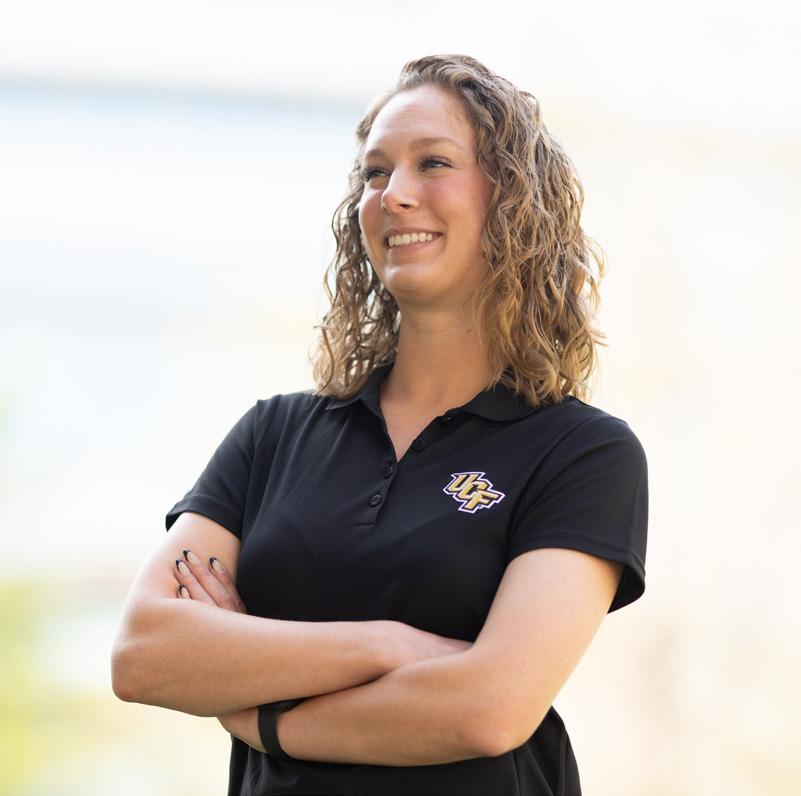
Raytheon Technologies, a research partner of the Department of Mechanical and Aerospace Engineering, was so impressed with the work of recent intern Sydney Giannuzzi that they honored her with an Innovation Achievement Award for her outstanding contributions to their research and to the team.
“Sydney’s work ethic and enthusiasm for the project are remarkable, and it has been a pleasure to have her be our intern this summer,” the awarded certifcate reads. “We are looking forward to continued collaboration with her throughout her Ph.D. work.”
Giannuzzi completed the internship this past summer at the defense company’s Hartford, Connecticut, location. She worked on the design and analysis of a novel fow valve that can more easily test operating conditions for aircraft engines. The goal is to better understand the damping process so that aircraft engine designers can prevent the dangerous conditions that could lead to engine failure.
The project is funded through a $899,000 grant from the Ofce of Naval Research, which facilitated the collaboration between Raytheon and UCF. Jefrey Kaufman, director of UCF’s aerospace engineering program, is the principal investigator of the project, which includes two 10-week internships at Raytheon.
To read more of our


The MAE millionaires are an elite group of mechanical and aerospace engineering faculty members who have earned multi-million grants over the course of the past decade.

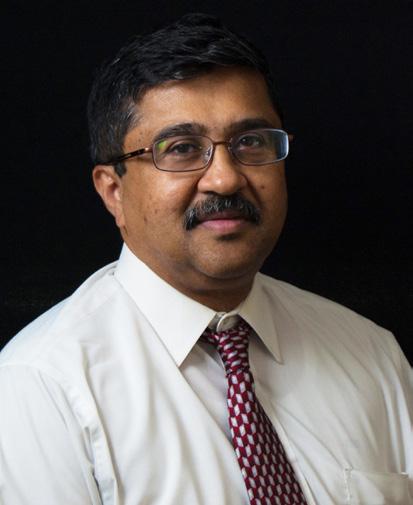
$10 MILLION
JAYANTA KAPAT

$1.7 MILLION TEXAS A&M ENGINEERING EXPERIMENT
$2
$1.5 MILLION BOEING
JAYANTA KAPAT

$1.2
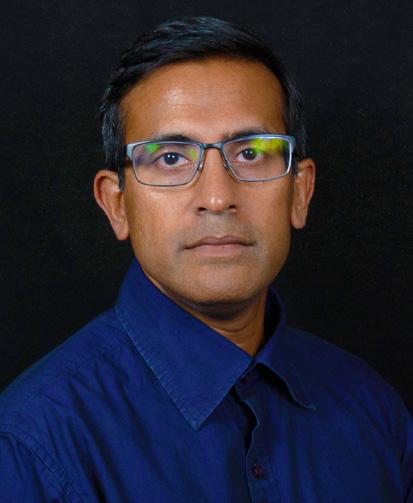

$3.5 MILLION
U.S. DEPARTMENT OF ENERGY
TUHIN DAS

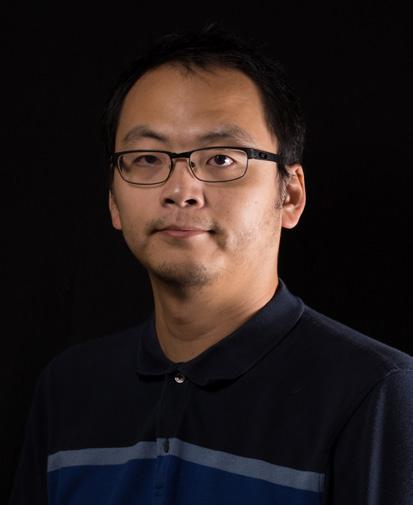
$1.8 MILLION
NATIONAL INSTITUTES OF HEALTH
QIUSHI FU

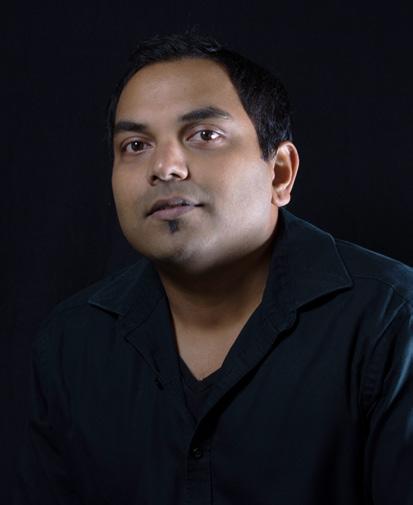
$1.1 MILLION
U.S. DEPARTMENT OF ENERGY
$2.7 MILLION
U.S. DEPARTMENT OF AGRICULTURE
YUNJUN XU
SUBITH VASU
$1.5 MILLION NATIONAL INSTITUTE ON AGING HELEN HUANG

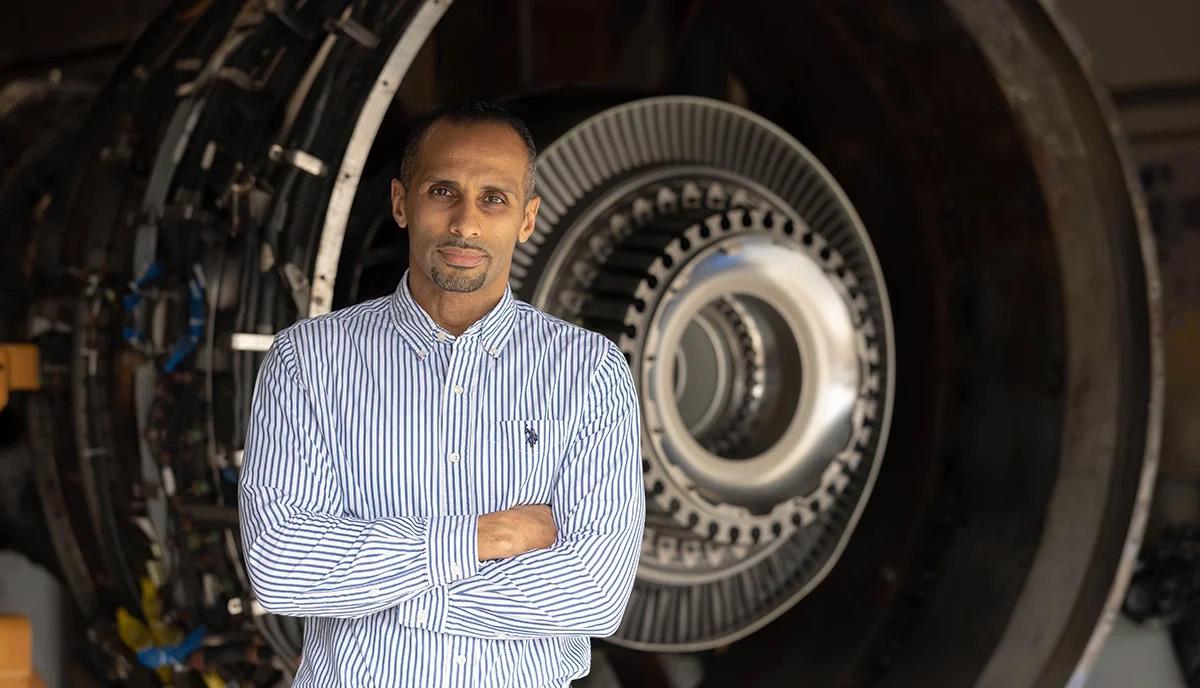
substantial new funding from the U.S. Department of Defense is helping further establish the University of Central Florida as a leader in hypersonics and space propulsion research not only in the nation, but in the world.
Hypersonic propulsion would allow for air travel at speeds of Mach 6 to 17, or more than 4,600 to 13,000 miles per hour, and has applications in commercial and space travel.
Over the past year, the DoD has

awarded funding to hypersonics research led by Mechanical and Aerospace Engineering Professor Kareem Ahmed to support the advancements he’s making in the technology.
The awards are funding the construction of a hypersonic testing facility, flight experiments and further advancements of the technology.
The support is a testament to the progress UCF has made in the field, including developing the first hypersonic rotating detonation
rocket engine, which could allow for air travel from New York to L.A in less than 30 minutes. It also comes on the heels of recently received DoD funding to build a morphing hypersonic engine.
“High-hypersonic propulsion technology is being born here, similar to how new technology was developed at Kennedy Space Center during the space era,” Ahmed says. “Now it’s happening at UCF. The new funding highlights that we’re a major player in hypersonic propulsion.”
Achieving ultra-high-speed flight at hypersonic speeds is a national priority and an international focus driving the hypersonics and space race. Such systems would allow flight through our atmosphere at very high speeds and allow efficient entry and exit from planetary atmospheres. This will make hypersonic defense systems, space exploration, and intercontinental travel as routine as intercity travel is today.
Advanced hypersonic propulsion systems are needed to maintain the technological superiority of the U.S. Air Force relative to the growing technological threat from adversaries. High-speed propulsion research requires hypersonic facilities that could generate the representative flight Mach numbers and enthalpies.
This project, funded by the U.S. Air Force Office of Scientific Research (AFOSR), aims to develop a unique mid-scale high-hypersonic enthalpy propulsion testing facility at UCF for integrated hypersonic materials, aerodynamics, and propulsion research (HiHYPER). HiHYPER will provide significant new capabilities to explore the fundamentals of the hypersonic regime and overcome the most significant national challenges where advances are needed in hypersonic research.
This project’s objective is to develop the experimental hardware for a flight experiment to stabilize and investigate standing oblique detonation waves under an AFOSR program.
The technology offers improved jet propulsion engine efficiency so that more power is generated while using less fuel than traditional propulsion engines, thus lightening the fuel load and reducing costs and emissions.
In addition to faster air travel, the technology could also be used in rockets for space missions to make them lighter by requiring less fuel, travel farther and burn more cleanly.
The flight experiments are critically needed to provide the structure and dynamic details of standing oblique detonation waves in a hypersonic flight regime. The flight experimental results will form the foundation for hypersonic detonation engines.

Distinguished Fellow: Advanced Flow-Independent Fuel Injector for Naval
This project, funded by the Office of Naval Research, will explore and document the evolution spray and splash dynamics of the flow independent fuel injector, a type of fuel injector designed to deliver a consistent and precise amount of fuel regardless of variations in fuel pressure.
Fuel control will improve Navy applications system performance that are reliant on jet-in-crossflow fuel injectors commonly used in combustors and augmentors to fuel modern Navy propulsions systems, such as the F35.
These improvements will lead to efficient propulsion and power systems that control jet fueling for enhanced performance. Fuel injection is a critical technology for Navy Aircraft propulsion, unmanned aerial vehicles, ship propulsion and power, ramjets/scramjets and missiles.


Artificial intelligence (AI) isn’t just used to power electronics, apps or self-driving cars — it’s also driving key innovations in agriculture. From sensors that can monitor soil and water to autonomous robots that can harvest crops, AI is making farming more efficient, sustainable and cost effective.
In an effort to expand the use of AI in agriculture, several UCF researchers will work together to develop several AI-driven technologies that aim to improve the industry’s field operations. The team is supported by a $2.74 million grant from the U.S. Department of Agriculture (USDA) – National Institute of Food and Agriculture (NIFA). The funded project will specifically enhance the agricultural applications produced by the AI Institute for Transforming Workforce and Decision Support (AgAID), an institute funded by NIFA.
Leading the charge for UCF is Professor Yunjun Xu of the

Department of Mechanical and Aerospace Engineering. He will use his expertise to develop AI methods for motion control and scheduling in agricultural robots. These autonomous ground robots are used to conduct several operations in open fields such as detecting diseases and harvesting crops.
Collaborating with Xu are Professor Ladislau Bölöni of the Department of Computer Science and Assistant Professor Chen Chen from the Center for Research in Computer Vision. Bölöni will strive to integrate AI into the manipulation of agricultural robotic arms to improve the way they interact with their physical environment, while Chen will investigate a new AI method for the sensors used in precision agriculture, a farming practice that uses technology to make more accurate and informed decisions.
Also on the project is chemistry Professor Swadeshmukul Santra, who will work with Chen and Xu to integrate AI into the analysis of
pesticide residues.
The UCF team hopes that these technologies will be of use to both current and future generations of farmers and AgAID researchers.
“We anticipate that each AI method will advance its respective state-of-the-art technology and can have performance superior to existing or traditional methods,” Xu says. “We also hope to inspire more people, especially younger generations, to join the U.S. agricultural sector workforce.”
To spark an interest in agriculture, the UCF researchers plan to coordinate various outreach activities for students including a summer exchange program and workshops. They also plan to develop a new course and training materials around this work, which will be facilitated with the help of graduate students.
The project is funded via the NIFA interagency application program in conjunction with the U.S. National Science Foundation.
Many everyday tasks require the use of two limbs.
But when people experience a debilitating medical condition such as a stroke or loss of a limb, these same everyday tasks may become a struggle.
Qiushi Fu, a professor in UCF’s Department of Mechanical and Aerospace Engineering within the College of Engineering and Computer Science, aims to alleviate such struggles with his new research on bimanual coordination that began in March as part of a National Institutes of Health grant.
Fu is observing how people interact with tasks that require coordinating two limbs, each controlling a robotic device, to complete a task within a virtual environment. The catch is that his task simulations will randomly impede his trial participants and lead them to decide how to compensate for the constraint placed upon one or more limbs.
However, there will be much more practical activities, too, Fu says.
“It’s important to go beyond experimental tasks and have participants perform actual real-life tasks,” he says. “We also want to measure coordination in everyday tasks like buttoning or cutting a

piece of paper with motion tracking technologies.”
Fu proposes that the knowledge gained in this project can provide significant insight to improve the effectiveness of motor rehabilitation interventions for restoring upper-limb function in individuals affected by neurological disorders.
“The objective of this is research is we want to understand how our brain controls our two hands to work on a task with a common goal,” he says. “One example is you’re pouring water from a bottle to a cup. So, imagine the hand holding the cup is being pushed by something. To successfully perform the task is to move the hand back or move the pouring hand, or both.”
The research will use healthy young participants to perform those activities while their brain activity is monitored to acquire a foundational understanding of bimanual coordination, Fu says.
“If one hand makes a mistake or is impaired then the other can help compensate,” he says. “This is a decision the brain has to process, and we’re studying how the brain achieves this.”
Data will be gathered noninvasively, as participants will wear a fitted cap that will measure neural activity via electrodes. There
also will be measurements of limb movements, muscle activities and eye movements to pair with the neural data.
Fu says he was motivated to investigate further when he noticed prior research on bimanual coordination primarily focused on tasks that require each limb to attain an independent goal rather than a common goal.
“None of these studies focused on how they complement each other,” Fu says. “I found that this particular topic wasn’t well understood, and in the past the research has focused on independent goal tasks, and our project focuses on common goal tasks.”
Although Fu is the principal investigator, he is collaborating with other UCF faculty within the Disability, Aging and Technology faculty cluster initiative to use their expertise in measuring brain activity for the research. He is also working with scientists at Arizona State University to apply neural stimulation to examine the functional role of a few different brain areas.
“We’re hoping our research will provide biomarkers and baseline data to further investigate into patient populations to perform rehabilitation interventions and even regain motor control,” Fu says.



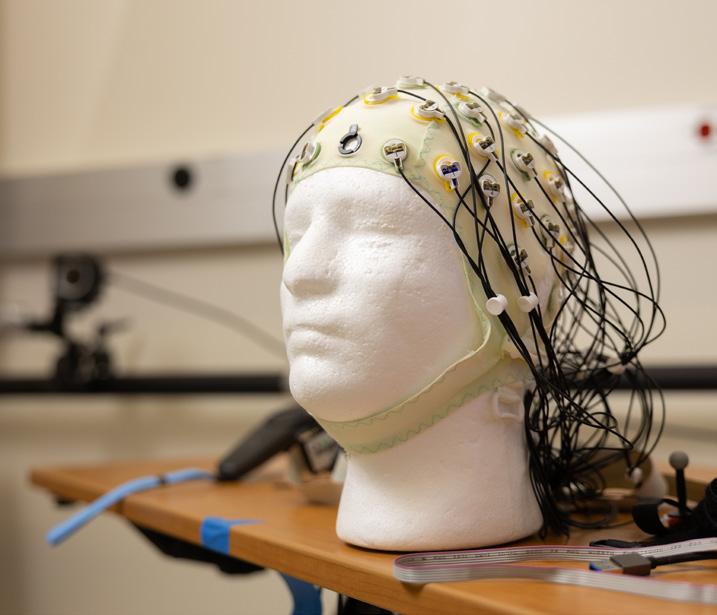

Cislunar space, which stretches from the Earth to just beyond the moon’s orbit, is about to become heavily trafcked over the next 10 years. With NASA’s planned Artemis missions and other countries joining in the cislunar space race, there’s an interest in observing, tracking and predicting the orbit of objects like asteroids and satellites so they don’t collide with spacecraft.
But the process of detecting and observing space objects, known as space domain awareness (SDA), faces challenges with the extensive volume of cislunar space.
“Cislunar space is vast,” says Tarek Elgohary, an associate professor of aerospace engineering. “The current SDA infrastructure, which is mostly Earth-based, is not equipped to provide the needed coverage in cislunar space. There is a need for fast and accurate solutions to quantify uncertainties to improve predictions and provide SDA information in the absence of continuous coverage.” Elgohary and his team will develop those solutions with the support of a $350,000 grant from the Air Force Ofce of Scientifc Research Dynamic Data and Information
Processing Program. They will create a computational framework to rapidly and accurately track space objects in real time, onboard spacecraft or satellites like the Air Force Research Laboratory’s Oracle, which is designed to increase SDA capabilities in cislunar space. The algorithms will allow Oracle and other spacecraft to operate autonomously without intervention from Earth.
Those same algorithms could also have an impact on maritime domain awareness (MDA). Just as spacecraft might need to identify space junk or track the orbit of a satellite, watercraft need to identify other vessels, predict target trajectories and detect suspicious behavior in real-time.
“Space and maritime domains share a lot of similarities in terms of the lack of continuous coverage of spacecraft or vessels, the large size of the search domain, and the need for the capability to predict maneuvers,” Elgohary says. “Maritime domain awareness may require shorter time scales; however, with the expansion of space missions, space domain awareness operations have been reduced from weeks and days to hours and minutes.”

Elgohary will use his expertise in space to develop a similar computational framework for the sea. The algorithms developed for uncertainty quantifcations will advance MDA and allow sea vessels to detect objects in real time and predict their future location.
This work is funded through a $150,000 grant from Lockheed Martin.
Written by Marisa Ramiccio
To learn more about Elgohary’s work, visit bit.ly/asrlucf.
Aerospace engineering doctoral student Bethany Hintz is launching her career to new heights after receiving a prestigious invitation from the U.S Air Force. Hintz was selected for the Science, Technology, Engineering, Mathematics and Medical Services (STEM+M) Program, a graduate education program geared toward U.S. Air Force employees. The program gives recipients the opportunity to pursue a master’s, doctoral or certifcate program.
“I feel incredibly honored to have been selected for the U.S. Air Force’s STEM+M program,” says Hintz. “Having the opportunity to pursue my doctorate degree motivates me to excel and advance my education to support the Air Force mission.”
Hintz is member of the Astrodynamics and Space Robotics Laboratory led by Associate Professor Tarek Elgohary. Its research covers dynamics, and control and
computational methods with a focus on space fight applications, including orbital mechanics, space proximity operations, robotics and space situational awareness methods.
During the program, Hintz will be working with her doctoral advisor Elgohary to research optimal control applied to solving problems in space fight applications. She looks forward to using her expertise to support U.S. Air Force missions.
“My selection, participation and graduation from this program will ensure the U.S. Air Force continues to dominate air, space and cyber domains, maintain a world-class STEM workforce and ultimately lead to warfghter success,” says Hintz.
UCF is the perfect ft for Hintz as she works pursue her aerospace aspirations. She says she chose the university for its years-long top billing as Aviation Week Network’s No. 1 supplier of graduates to the aerospace and defense industry.

“Their aerospace engineering programs are some of the most prestigious in the country, and they partner with a variety of aerospace and defense companies,” Hintz says. Her selection to the program brings her one step closer to realizing her future career plans. Hintz plans to continue to serve the nation through the U.S. Air Force once she completes her doctorate.
“I hope to continue my career long-term with the Department of the Air Force, eventually pursuing opportunities with the senior executive service,” she says. “Completing my doctorate degree with STEM+M will make me competitive for these types of positions in the future.”
Written by Bel Huston
For more student news from the department, visit bit.ly/maenews

Receiving paid tuition, annual stipends, an internship and guaranteed employment after graduation sounds like a dream come true to any college student. But for several UCF students, that dream is about to become a reality.
Ten Knights, including two from the Department of Mechanical and Aerospace Engineering, were selected for the 2024 Department of Defense (DoD) Science, Mathematics and Research for Transformation (SMART) Scholarship, an educational and workforce opportunity available to undergraduate and graduate students pursuing STEM degrees. The program covers the cost of tuition and education related expenses, provides an annual stipend of at least $30,000 a year, provides a mentored internship experience during the summer and ofers employment at a DoD facility upon degree completion. The goal of the program is to build a workforce of leaders in the STEM disciplines.
Thomas Nguyen Doctorate in biomedical engineering
Nguyen is no stranger to prestigious internships. The biomedical engineering doctoral
student previously completed the Naval Research Enterprise Internship Program (NREIP), sponsored by the Ofce of Naval Research. Fittingly, Nguyen completed his DoD SMART internship with the Naval Air Warfare Center Training Systems Division (NAWCTSD). He says both his time at UCF and his experience with NREIP have prepared him for this opportunity.
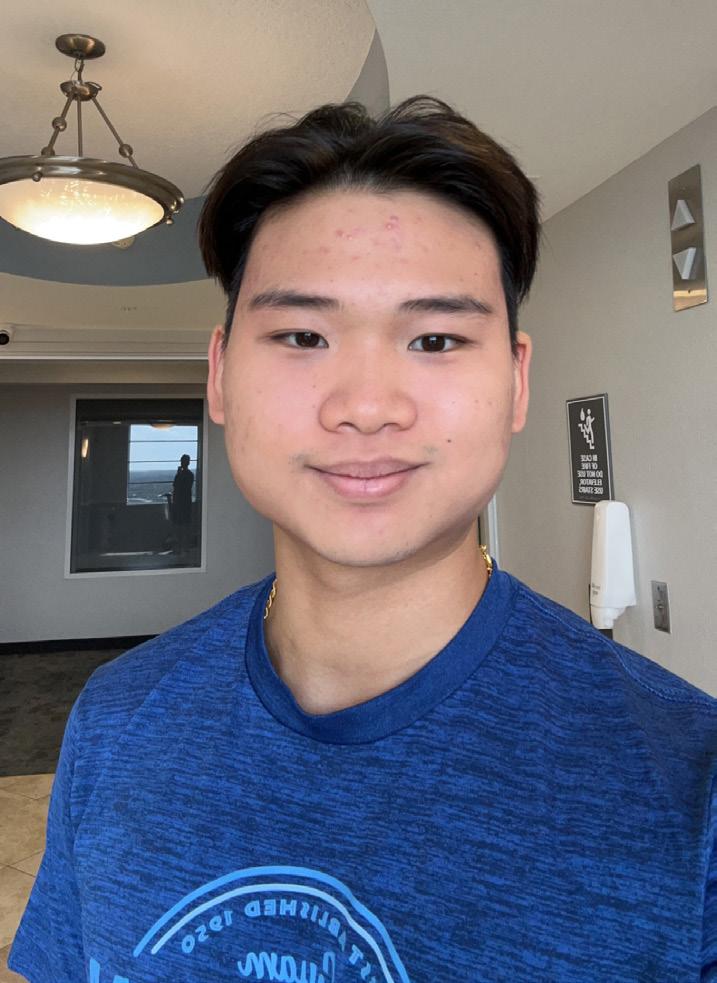
“Notably, my involvement in projects like the T-45 Flight Simulator Development and the Dental Aerosol Reduction System (DARS) project during my NREIP internships has provided me with frsthand experience in applying engineering principles to defense-related simulations,” Nguyen says. “These experiences have prepared me to excel in a dynamic and challenging environment, where innovation and technical expertise are paramount.”
Nguyen will work under the mentorship of senior research and development engineer Rocco Portoghese, assisting with projects that leverage simulation technologies to enhance the efectiveness of military training.
“During my internship at NAWCTSD, I will have the privilege of working under the mentorship of Rocco Portoghese,” Nguyen says. “Mr. Portoghese brings a wealth of experience in defense simulation and training, and I look forward to learning from his expertise and guidance.”
The Knight will have the chance to incorporate his knowledge and skills developed at UCF into the experience. He says he choose to earn his doctoral degree at UCF
because of its reputation for interdisciplinary research and innovation.
“The [doctoral] program’s focus on biomedical engineering allows me to integrate my expertise in mechanical engineering with health sciences, enabling me to address critical challenges in healthcare and biotechnology,” Nguyen says. “Specifcally, my research interests lie in leveraging simulation technologies to enhance medical training and surgical procedures, ultimately improving patient outcomes and healthcare efciency. UCF provides an ideal environment for me to pursue these interests, ofering stateof-the-art facilities and collaborative opportunities that align perfectly with my career goals.
Through his work, Nguyen hopes to enhance his knowledge of simulation technologies, develop technical skills in electrical circuitry and 3D design, and emerge from the internship as a leader ready for a career with a defense organization.
“This opportunity represents a pivotal moment in my academic and professional journey, allowing me to contribute directly to defense technology while furthering my education,” Nguyen says. “I am eager to immerse myself in challenging projects and collaborate with experts in the feld, ultimately making meaningful contributions to the defense industry.”
Louis Vest
Doctorate in aerospace engineering
Before Louis Vest decided to pursue a doctoral degree, he debated following in his father and grandfather’s steps to join the military. With the SMART Scholarship program, he’s able to serve his country in a diferent way.
“My father instilled in me a very serious work ethic and a dedication to take advantage of opportunities that he did not have, in this case, being able to go to school,” Vest says. “I think the biggest driving force for [why I applied to] SMART was … having the opportunity to serve my country as a civilian contractor with the DoD.”
Vest always knew he wanted to be an engineer, but his journey at UCF solidifed his career would be in the aerospace industry. The doctoral student’s research focuses on fundamental fuel chemistry, and
he is mentored by Professor Subith Vasu, who studies clean energy and hypersonic travel advancement.

“Upon connecting with [Dr. Vasu], he was the reason that I came out to UCF,” Vest says. “I had done a little bit of reading on research opportunities with Vasu that students were able to pave their way through, and it felt like a very natural ft. … The environment, and by extension the community, that UCF fosters, particularly in the sciences, is unparalleled.”
Next summer, he’ll intern at the Naval Surface Warfare Center in Indian Head, Maryland, gaining handson experience and industry insights that would normally take years to achieve, he says.
“I hope to be a part of the next generation of researchers who fnd the most efcient fuels to be used in the aerospace and astronomical industries,” Vest says, “And I’m hoping to gain the opportunity to work alongside other engineers and partners to efectively help pave the way for the next frontier, which I believe is space.”
Written by Marisa Ramiccio and Nicole Dudenhoefer

Pegasus Professor and Trustee Chair Jayanta Kapat has been selected for the 2024 International Gas Turbine Institute’s Industrial Gas Turbine Technology Award. This honor, presented by the American Society of Mechanical Engineers, recognizes the scientifc or technological contributions of the recipient to the feld of electric power or gas turbine machinery.
As the 2024 honoree, Kapat will be presented with a plaque at the 2024 ASME Turbo Expo in London. He also has the option of presenting a featured lecture during the event.
Kapat joined UCF in 1997 and now serves as the director of the Center for Advanced Turbomachinery and Energy Research (CATER). Through the center, he has gathered a core faculty with multidisciplinary backgrounds to solve research problems related to power generation, aviation and propulsion. The center also facilitates graduate research and has seen its students placed in successful internships, fellowships and jobs.
Over the years, Kapat has earned more than $16.5 million in research funding from major engineering organizations such as NASA, Lockheed Martin and Siemens. In 2016, he secured a $68 software grant to implement new computer programs that aid in student coursework and research.
He also leads a team of researchers from the University of Central Florida, Purdue University and Georgia Tech as they develop a jet engine that’s free of emissions — a project worth $10 million.

The Olympics might have been the biggest event to take place in France this year, but for one UCF Knight, a more exciting experience awaits him in The Hexagon. Doctoral student Pugazh Sivasankar has been selected for the Chateaubriand Fellowship, a research program that aims to strengthen the research collaborations between the U.S. and France. He was one of two students from UCF who was chosen for this experience.
Sivasankar will travel to France to complete a research project for four to nine months under the mentorship of French scientists. The fellowship will cover travel expenses and his stay in France.
“I feel joyful and at the same time more responsible towards my research as the Embassy of France is entrusting me with this fellowship,” Sivasankar says. “I feel a sense of gratitude for the support ofered by UCF and its faculty members.”
Sivasankar will explore his interest in aerospace engineering under the
tutelage of Nassim Razaaly, the head of the aerodynamics program at the École Nationale Supérieure de Mécanique et d’Aérotechnique near Poitiers. The research will tie into his dissertation, which focuses on the uncertainty of the states of objects in orbit around Earth, which can be used for debris tracking or estimating the probability of collisions.
He says he hopes that the fellowship will shape his academic pursuits, build his professional network and immerse him in the French culture.
“Exploring the French culture in terms of food, music, art and language refreshes me and enables me to befriend the locals by understanding their perspective,” Sivasankar says. “Having spent nearly six years in Europe before starting my Ph.D. at UCF has introduced me to a few professional contacts from France.”
Sivasankar earned his master’s degree from the Delft University of Technology in the Netherlands. While attending a research program
in Sweden, he bumped into a Knight who told him about the newly formed aerospace engineering doctoral program. He immediately applied and the rest is history. He says he appreciates the support of the faculty, and as an autistic student, the sense of empowerment received from UCF Student Accessibility Services.
As he enters his fnal year at UCF, Sivasankar hopes the fellowship will give him the experience he needs to land a job at Lockheed Martin.
“Much of my doctoral research has been sponsored by Lockheed Martin, so I hope to work for them after graduation,” Sivasankar says. “Having an international research experience and exposure sponsored by the Embassy of France will increase my value as a prospective employee.”
Written by Marisa Ramiccio
Many students dream of working for Lockheed Martin. But they don’t have to wait until graduation – they can work for the defense company as an undergraduate or graduate student through the College Work Experience Program, also known as CWEP.
CWEP allows students to work at Lockheed Martin for at least two consecutive semesters. During that time, they gain hands-on experience through diferent projects, work under the supervision of Lockheed Martin employees – and get paid for the work that they do.
Aerospace engineering doctoral student Kristina Pionessa ’22 ‘23MS started in CWEP as an undergraduate and has remained in the program for the past fve years, developing both her technical and soft skills along the way.
“My experiences gave me the opportunity to apply the information learned in courses to real-life design and analysis,” Pionessa says. “It’s hard for me to think of a skill I didn’t get to build because I’ve been in the program for fve years now, and it has been an endless learning opportunity.”
Pionessa has had the opportunity to get her feet wet in diferent areas of engineering, from quality assurance to aerodynamics. She’s worked in the Infrared Track and Search program, learning how to evaluate trending failures and discovering how diferent engineering teams work together to identify problems and create solutions. She’s also developed her skills in computational fuid dynamics and gained knowledge in missile design, fight mechanics and hypersonics through the Aerodynamics Center of Excellence. Throughout these experiences, the Lockheed Martin team encouraged her growth as a student and as an engineer.
“As a CWEP student, my leads pushed me to constantly learn new tasks,” Pionessa says. “When I was confdent in a task, I could train a newer student to take on that task and my team would teach me something else. I had a team that knew me, pushed for me to be learning endlessly and had full confdence in my abilities.”
The Knight has also grown her professional network, with mentors who work in mechanical design, manufacturing, thermal design and aerodynamics at Lockheed Martin. She hopes to work alongside of those mentors as a full-time employee

post-graduation. But she’ll have to complete her doctoral degree frst. As a two-time graduate, returning to UCF was an easy choice. But her decision was infuenced by opportunities CWEP could provide.
“UCF was a great option in terms of the program and environment, but I didn’t have to uproot my CWEP opportunity or overall life which was a plus,” Pionessa says. “I have always known I wanted to work within industry, so UCF was one of a few schools that had the opportunity to work year-round with the CWEP experience.”
Pionessa isn’t the only student to beneft from the program. To date, thousands of Knights have completed the program.
“Every year, more graduate-level students in CECS recognize CWEP’s ability to broaden their experience,” says Ali Gordon, the associate dean for graduate afairs. Beyond students like Kristina, prospective students who’ve completed degree programs at other institutions are enrolling in UCF’s graduate programs to enhance their chances of landing career opportunities in aerospace and defense companies.”
Written by Marisa Ramiccio

Department of Mechanical and Aerospace Engineering
College of Engineering and Computer Science
University of Central Florida 12760 Pegasus Drive Orlando, FL 32816
UNDERGRADUATE PROGRAMS
Bachelor of Science in Mechanical Engineering
Bachelor of Science in Aerospace Engineering
Minor in Bioengineering
MASTER’S PROGRAMS
Master of Science in Mechanical Engineering
Master of Science in Aerospace Engineering
Master of Science in Biomedical Engineering
DOCTORAL PROGRAMS
Ph.D. in Mechanical Engineering
Ph.D. in Aerospace Engineering
Ph.D. in Biomedical Engineering
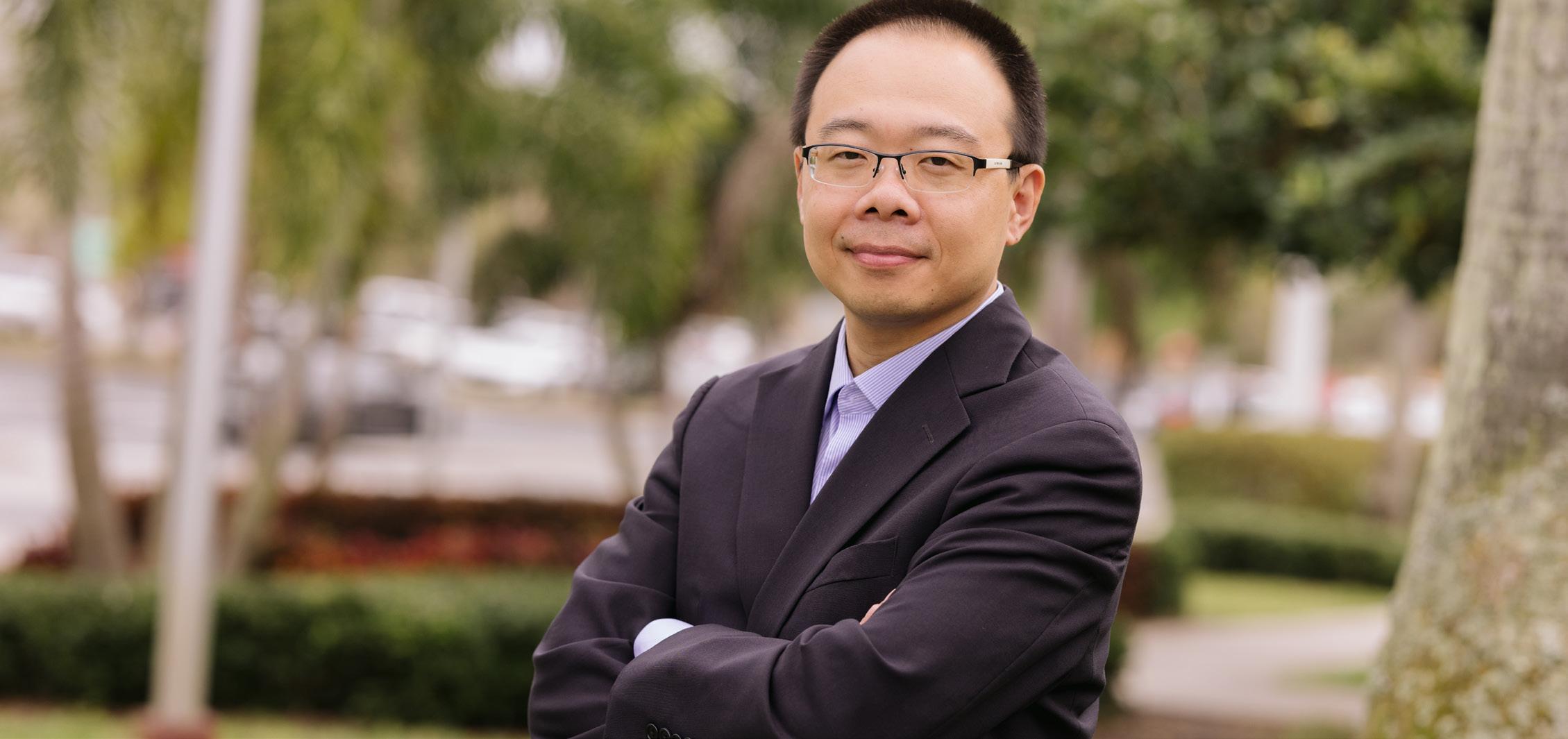
Associate Professor Dazhong Wu received a 2024 Reach for the Stars Award, which is given to UCF faculty who have accomplished highly successful research and creative activities.